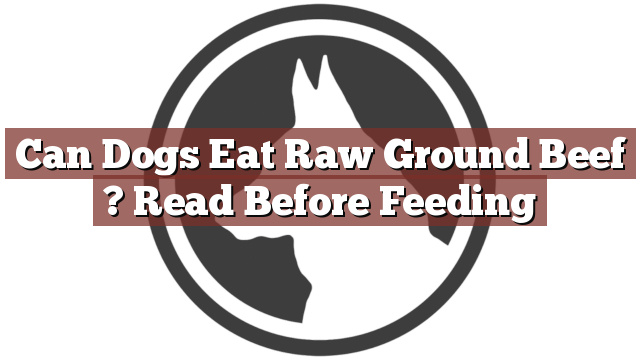Understanding Your Dog’s Dietary Needs
As a responsible dog owner, it is crucial to understand your pet’s dietary needs to ensure their overall health and well-being. Dogs require a balanced and nutritious diet to thrive, just like humans. While dogs are primarily carnivores, their diet can include a variety of different foods, including meat, vegetables, and grains.
Can Dogs Eat Raw Ground Beef? Read Before Feeding
Now, let’s address the question, "Can dogs eat raw ground beef?" The answer is yes, dogs can eat raw ground beef. In fact, many dog owners choose to incorporate raw meat into their pet’s diet, often referred to as a "raw food diet" or "BARF" (Biologically Appropriate Raw Food). However, it is essential to take certain precautions and considerations before feeding your dog raw ground beef.
Pros and Cons of Feeding Raw Ground Beef to Dogs
Feeding raw ground beef to dogs has both pros and cons that should be taken into account. One of the main advantages is that raw ground beef is a rich source of high-quality protein, essential amino acids, and various vitamins and minerals. It closely mimics the natural diet that dogs would consume in the wild. Additionally, some dog owners believe that raw food diets can improve their pets’ coat condition, increase energy levels, and promote dental health.
On the other hand, there are potential risks associated with feeding raw ground beef to dogs. Raw meat can contain harmful bacteria like Salmonella or E. coli, which can lead to foodborne illnesses in both dogs and humans. Dogs with compromised immune systems, young puppies, or senior dogs may be more susceptible to these risks. It is crucial to handle raw meat carefully, ensuring proper storage, cleanliness, and hygiene practices to minimize the chances of bacterial contamination.
In Conclusion: Weighing the Risks and Benefits of Raw Ground Beef for Dogs
While dogs can eat raw ground beef, it is important to consider the potential risks and benefits before incorporating it into your pet’s diet. Consult with your veterinarian to determine if a raw food diet is suitable for your individual dog, taking into account their age, health condition, and specific dietary needs. If you decide to feed your dog raw ground beef, ensure that you source it from reputable suppliers, practice safe handling and storage procedures, and monitor your dog’s health closely for any signs of digestive issues or foodborne illnesses.
Remember, every dog is unique, and what works for one may not work for another. Ultimately, providing a balanced and nutritionally complete diet is key to keeping your furry friend healthy and thriving.
Thank you for taking the time to read through our exploration of [page_title]. As every dog lover knows, our furry friends have unique dietary needs and responses, often varying from one canine to another. This is why it's paramount to approach any changes in their diet with caution and knowledge.
Before introducing any new treats or making alterations to your dog's diet based on our insights, it's crucial to consult with a veterinarian about [page_title]. Their expertise ensures that the choices you make are well-suited to your particular pet's health and well-being.
Even seemingly harmless foods can sometimes lead to allergic reactions or digestive issues, which is why monitoring your dog after introducing any new food item is essential.
The content provided here on [page_title] is crafted with care, thorough research, and a genuine love for dogs. Nevertheless, it serves as a general guideline and should not be considered a substitute for professional veterinary advice.
Always prioritize the expert insights of your veterinarian, and remember that the health and happiness of your furry companion come first.
May your journey with your pet continue to be filled with joy, love, and safe culinary adventures. Happy reading, and even happier snacking for your canine friend!

